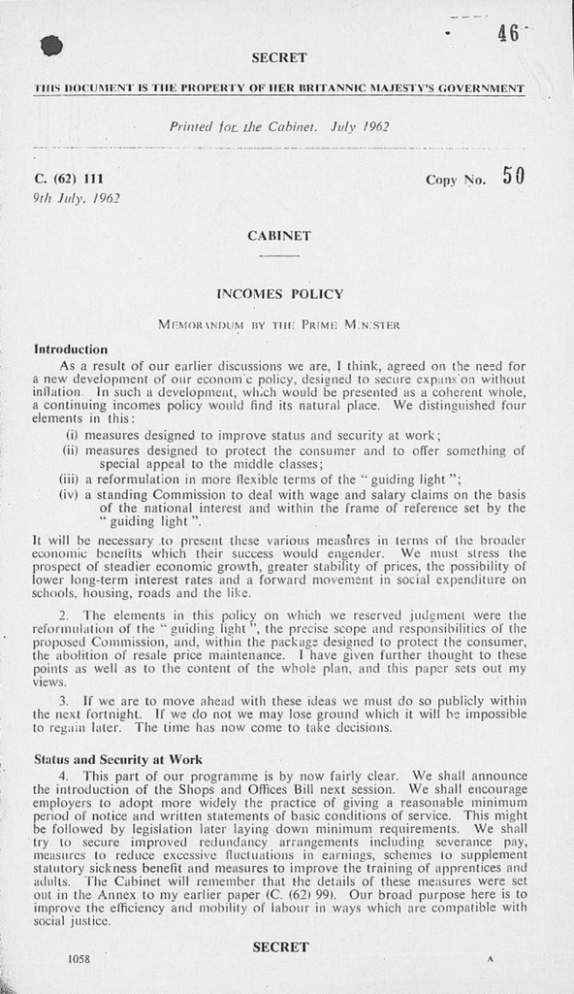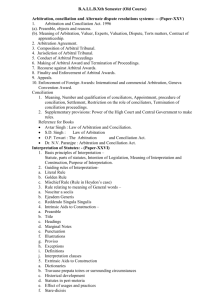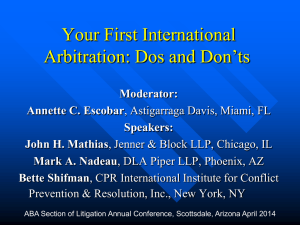Printed for, the Cabinet. July 1962 9th July, 1962 111
advertisement

TlftS D O C U M E N T IS T H E PROPERTY OF HER ItRITANNlC M A J E S T V S G O V E R N M E N T Printed for, the Cabinet. July 1962 C. (62) 111 9th July, Copy No. 50 1962 CABINET INCOMES MHMORANDUiVl BY Till; POLICY PRFMB MINISTER Introduction As a result of our earlier discussions we are, I think, agreed on the need for a new development of our e c o n o m c policy, designed to secure expansion without inflation. In such a development, which would be presented as a coherent whole, a continuing incomes policy would find its natural place. We distinguished four elements in this: (i) measures designed to improve status and security at work; (ii) measures designed to protect the consumer and to offer something of special appeal to the middle classes; (iii) a reformulation in more flexible terms of the "guiding l i g h t " ; (iv) a standing Commission to deal with wage and salary claims on the basis of the national interest and within the frame of reference set by the " guiding light ". It will be necessary to present these various measures in terms of the broader economic benefits which their success would engender. We must stress the prospect of steadier economic growth, greater stability of prices, the possibility of lower long-term interest rates and a forward movement in social expenditure on schools, housing, roads and the like. 2. The elements in this policy on which we reserved judgment were the reformulation of the " g u i d i n g light", the precise scope and responsibilities of the proposed Commission, and, within the package designed to protect the consumer, the abolition of resale price maintenance. I have given further thought to these points as well as to the content of the whole plan, and this paper sets out my views. 3. If we are to move ahead with these ideas we must do so publicly within the next fortnight. If we do not we may lose ground which it will be impossible to regain later. The time has now come to take decisions. Status and Security at Work 4. This part of our programme is by now fairly clear. We shall announce the introduction of the Shops and Offices Bill next session. We shall encourage employers to adopt more widely the practice of giving a reasonable minimum period of notice and written statements of basic conditions of service. This might be followed by legislation later laying down minimum requirements. We shall try to secure improved redundancy arrangements including severance pay, measures to reduce excessive fluctuations in earnings, schemes to supplement statutory sickness benefit and measures to improve the training of apprentices and adults. The Cabinet will remember that the details of these measures were set out in the Annex to my earlier paper (C. (62) 99). Our broad purpose here is to improve the efficiency and mobility of labour in ways which are compatible with social justice. Consumer Protection 5. We have agreed to go forward with legislation on weights and measures and in principle with a Consumers Council which will not require legislation, but which cannot be set up before the Molony Report has been published. We also agreed that in the presentation of our new policy we should stress our achievements in the reduction of tariffs. We agreed that on monopolies and restrictive practices we should say that we are making a full review of existing legislation in the light of the experience of other countries and the criticisms and suggestions made in Parliament arid elsewhere. We agreed that for the time being it would be wrong to introduce any new procedure to deal with mergers. 6. The President of the Board of Trade has circulated a separate paper (C. (62) 112) dealing with resale price maintenance. Guidance on Increase in Incomes 7. In the February White Paper (Cmnd. 1626) we said that since national production per head has been rising by about 2-2^ per cent, a year in recent years the increase of wages and salaries, as of other incomes, ought to be kept within this figure during the next phase. Experience has shown that this guidance has been too rigidly interpreted. The issue of such guidance seems clearly to be an essential element in an incomes policy, but we must consider how it can be reformulated on a more flexible basis. 8. There are obvious dangers in making any statement at this stage that could be taken as an indication that we have changed our views; this might be interpreted as a repudiation of the February White Paper and might provoke the reopening of cases already settled. It may be possible to avoid this danger by indicating in general terms t h e way in which we contemplate that this earlier guidance might be interpreted more flexibly in future. 9. The broad principle that it is desirable to keep the rate of growth of wages and salaries in line with the rate of growth of national productivity (measured over a run of years rather than over any single year) must clearly remain the core of our incomes policy. The particular figure of 2\ per cent, was used in the White Paper not as a hard-and-fast figure which would be appropriate in every case but as an indication of the average rate of increase within which we ought to try to keep. 10. There are a variety of considerations which can properly be taken into account when this general guidance is applied to the circumstances of a particular case. For instance there may be advantage to the economy in increasing rates of pay in a particular industry in order to strengthen its manpower relative to that of other industries. Or an increase of more than 2\ per cent, may equally be justified in a case where labour is able to make a personal contribution to greater productivity or efficiency (i.e., where this is not merely achieved as a result of capital investment but through special effort on the part of the workers concerned). In addition we shall have to indicate more clearly the period of time over which the case for an increase in wages and salaries is to be measured. The February White Paper was silent on this point, largely because we felt at the time that to grant increases substantially above 2\ per cent., even in cases where more than a year had elapsed since the previous increase, would in practice open the door to widespread disregard of the incomes policy. In developing a longer-term policy we shall have to accept that it is reasonable to take proper account of the period which has elapsed since the last increase in pay. 11. I do not think that we shall be able in the immediate future to elaborate all this in precise terms, but these are the sort of ways in which we must work towards greater flexibility which will be needed in our long-term policy. T h e best vehicle for this guidance may prove to be the terms of reference of the Standing Commission on Incomes discussed in the next section of this paper. A Standing Commission on Incomes 12. In the light of our earlier discussions I have reconsidered with some of my colleagues the scope of such a Commission and the powers which it might be reasonable to entrust to it. The main difficulty revolves around the degree of compulsion which it would be proper to use in bringing claims before the Commission for examination. The most difficult aspect of this is the private sector. At one extreme we considered the idea of or the Commission itself to bring claims before consent of the parties to the claim. We felt that sector would be to move too far in one step, and impose it in the public sector alone. Public opinion breach with established traditions and practices resentment. empowering the Government the Commission without the to impose this in the private that it would not be right to is not yet ready for so great a and it would arouse bitter 13. We therefore agreed, and on further reflection I am clear that this is right, that while it would be the G o v e r n m e n t s purpose publicly to press the parties to important claims in the private sector to bring their case before the Commission before settlement, we could not compel them to do so. The Commission should, however, be able to examine ex post facto settlements which appeared to conflict with the national interest. 14. T have two further points to make on (his. Firstly, T think we must accept (hat where, under established machinery, settlements in the private sector are reached as the result of arbitration we cannot invite the Commission to review the arbitral award. In course of time arbitrators will increasingly come to take the national interest, as expressed either by the Government or by the Commission, into account in making their awards. Similarly it would be no part of these proposals to interfere with the operation of the Wages Councils. Secondly, and particularly where settlements are being examined ex post facto, it is important (hat the Commission^ reviews should not be merely negative, but should be positive and constructive. They should for example, cover the possible effect on other people of inordinate increases in wages without increases in productivity. They should also, where appropriate, draw attention to evidence of deficiencies or scope for improvements in the industry concerned, in such matters as restrictive labour practices, inellicient managerial organisation, limitations on mobility, wages structure, pricing policy, profits, and so on. We shall have to consider how best the Commission could be organised (e.g., by arrangements for a separate panel or by having expert staff for the purpose) to enable it to carry out such enquiries most effectively. (Possibly more searching enquiries could follow on a prima facie judgment on a particular settlement.) ft would be for the industry, or on occasion the Government, to put further action in hand in the light of the Commission^ views. 15. So far as the public sector is concerned we agreed that the Commission should become responsible for operating standing arrangements to keep under review the pay of particular groups;,Jhis could be done by making the existing review bodies (e.g., for doctors and dentists) panels of the Commission. It would also carry out the ad hoc reviews of the pay of a particular public service (e.g., police, probation officers, etc.) which have in the past been carried out by separate bodies set up for this purpose. 16. We were also inclined at one time to think that as well as these two specific functions in the public sector the Commission might have a general responsibility for advising on specially important claims which were likely to go to arbitration. The thought here was that the existing arbitration machinery would be left intact, but that the advice of the Commission would be made available to the arbitrators before they reached their decision. Some members of the Cabinet considered that we should go further than this and that the Commission should in some way absorb the existing arbitration machinery. 17. I now believe that either course would be wrong. Even the milder course would be interpreted as an interference with arbitration, if not a breach of formal arbitration agreements, and would once again mean applying to the public sector a sterner discipline than would apply to the private sector. This is not only unfair, it is illogical, since under the doctrine of comparability the public sector takes its cue from movements in the private sector and not the other way round. The public sector is not the pace setter. 18. It would follow from this that the Commission would be available, as claims referred to it with the consent of qW influence to see that this consent is machinery for arbitration will stand and 1058 in the public, just as in the private sector, an alternative to arbitration, to deal with both parties and we should naturally use forthcoming. But if it is not the existing the Commission will have no part to play. A 2 Nor would it be right to bring an arbitral award before the Commission for review./ since the Government would itself already have argued its case, including the' national interest, before the arbitrator. 19. In cases in which there is no built-in provision for arbitration, it might be possible to make use of the Commission in the event of disagreement between the parties concerned on a particular claim. Possible instances of this are university teachers and the teachers themselves, but the extent to which this could be done will need further study. 20. The nationalised industries should be dealt with on the same basis as the private sector. Thus we should not take power to compel reference of a particular claim in this field to the Commission if the parties are unwilling and we should not ask the Commission to review an arbitral award. We should of course continue to bring pressure on the Chairmen of the Nationalised Boards as we do at present. 21. In the light of the foregoing paragraphs the functions of the Commission can be summarised as follows: General (i) It would be provided with terms of reference reflecting the reformulation of the " guiding light " and, in addition to keeping watch on. the actual movement of incomes in relation to production, it would aim to build up a corpus of philosophy and experience on pay questions. (ii) Its proceedings would be in public and its findings, together with the reasons for them, would be published. Its findings would be in form advisory. (iii) The Commission would probably need to be composed partly of full­ time and partly of part-time members. It would have to be large enough to enable panels to be formed which could discharge without delay the range of business coming before the Commission. In the Private Sector (iv) It would consider important claims referred to it with the consent of both parties. * (v) Where a settlement had been reached without reference to the Commission which appeared to conflict with the national interest the Government would ask the Commission to conduct an ex post facto review and it would be given power to send for papers and persons. It would not, however, have power to review arbitral awards. In the Nationalised Industries, Local Government, etc. (vi) The Commission would consider claims referred to it with the consent of both parties, but not otherwise. It would have power in suitable cases to review settlements ex post facto, but would have no power to review arbitral awards. In the Public Services (vii) It would consider important claims referred to it with the consent of both parties. If this consent were not. forthcoming and where arrangements existed for arbitration the Commission would have no power or duty to intervene. N o r would it review arbitral awards. (viii) It would review under standing arrangements the pay of particular groups (e.g., doctors and dentists), (ix) It would conduct general reviews of the pay of a particular public service (e.g., police, probation officers). 22. A Commission with the limited powers I have described could be appropriately set up under prerogative powers and legislation would not be needed. I propose that it should be called the Royal Commission on Incomes. Presentation 23. If my colleagues accept these proposals I think it would be best to launch them on the country by way of a debate in Parliament. It should be our object 1 SECRET 5 to set our proposals in the context of growth of future prosperity and of the broader'international measures that may be called for and to rally public opinion to their support. We need not be too specific about the details at this stage. We should show enough of our hand to make intelligent discussion possible. The play of public opinion during the summer may be helpful to us when we come to take executive action after the recess. In the meantime informal consultation with the British Employers' Confederation and the Trades Union Congress on the general policy will proceed, while it will also be necessary to have more specific discussions with some of the bodies likely to be affected. e.g., the Staff Side of the National Whitlev Council, the Kindersley Committee on the Remuneration of Doctors and Dentists, the Franks Committee on the pay of the Higher Civil Service, etc. Conclusion 24. Subject to a decision on resale price maintenance, 1 invite my colleagues to authorise me to go forward with detailed planning on the lines set out in this paper. H. M. A dmiralty House, S. W. I, 5th July, 1962.





